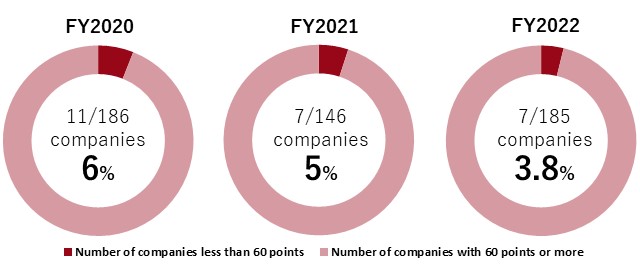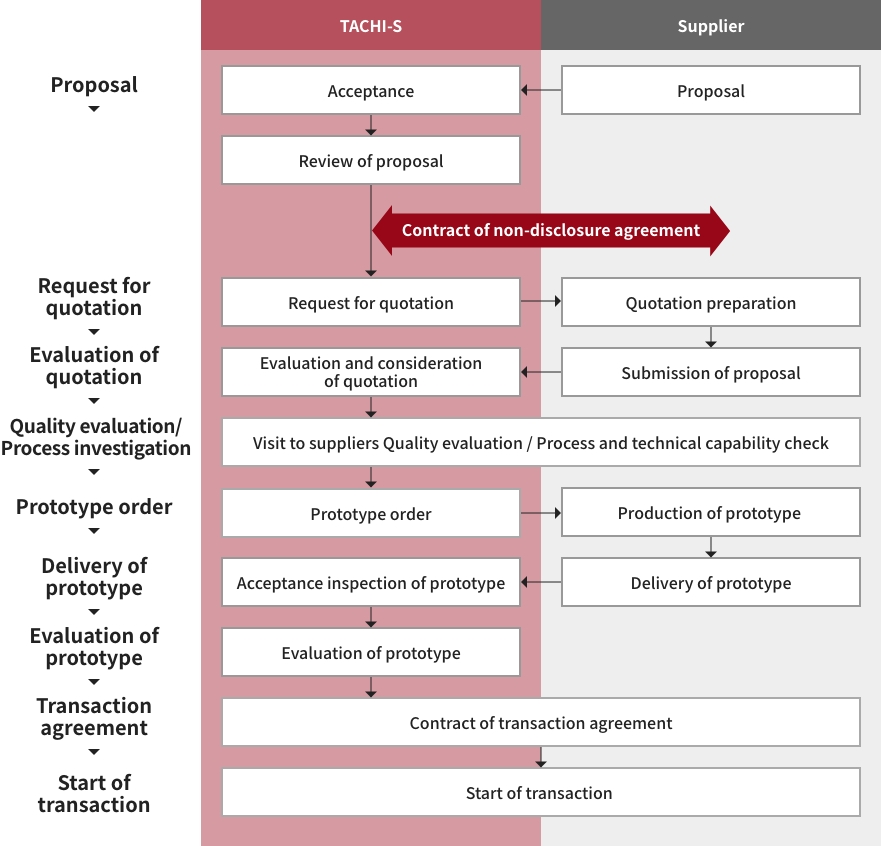Procurement Policy
Based on the "Basic Procurement Policy", we are conducting business activities that consider safety, environment,
human rights, compliance, and social responsibility.
We will procure products from our business partners. Promote this initiative throughout the supply chain and create
a sustainable society We aim to realize.
Basic policy of procurement
- We will comply with relevant laws and regulations and practice appropriate sales contracts.
- We will strive to improve QCD evaluation technology by collecting information inside and outside the company and
sharing it.
- We will comply with fair and impartial handling in transactions and strive to foster mutual trust.
- We will thoroughly manage confidential information and strive to prevent leakage.
- Promote procurement activities that consider human rights and labor, safety and health, and the environment.
Efforts to strengthen the supply chain
In order to contribute to society and the environment throughout the supply chain, we believe it is important to build
strong relationships with our business partners and develop each other. Through the "Procurement Policy Briefing
Session" held every year, we will understand our way of thinking and priority activities related to manufacturing,
comply
with related laws and regulations, and evaluate and select fair and impartial business partners. We will aim for
growth
together.
Supplier Scorecard
In order to improve the corporate value of our business partners, we evaluate them from the perspective of QCD once a
year. For business partners who need improvement, each department of our company cooperates and provides support.
BCP Initiatives
We are continuing to take measures to prevent procurement risks that affect production activities, such as natural
disasters, fires, cyber terrorism, financial problems of business partners, and successor problems.
Check supply chain information and business partner company information to extract risks. If there is concern about
the
extracted risks, we conduct individual hearings, etc. to confirm the issues, and work together with our business
partners
to solve them, thereby increasing the continuity of our business activities.
Initiatives for Conflict Minerals*
We participate in "Responsible Minerals Trade Working Group" of JEITA (Japan Electronics and Information Technology
Industries Association) to confirm the latest content about minerals trade and promote our response to the conflict
minerals issue in cooperation with industry groups. In addition, once a year, we conduct a survey of the place of
origin of
conflict minerals.
If it is found that conflict minerals are contained in our product components or raw materials through investigation,
we will
consult with the relevant business partners and we will take appropriate measures such as discontinuing its use
immediately.
* Conflict minerals: Mineral resources mined in conflict areas such as African
countries. In particular, under the terms of
the U.S. Financial Regulatory Reform Act (Dodd-Frank Act), four types of conflict minerals, Tin, Tantalum, Tungsten,
and
Gold, are defined as conflict minerals and are referred to as 3TG for short. Minerals mined in the area have become a
source of funding for the activities of local armed groups.
In addition, some of the mining activities of cobalt and mica (mica) are considered to be factors of child labor and
bribery,
and to eliminate ESG risks such as human rights violations, we define them as target minerals and conduct surveys.
Addressing human rights and labor risks
In addition to requests to business partners according to the Supplier CSR Guidelines, we request self-checks from our
business partners. We verify human rights and labor risks based on self-checks and provide feedback and enlightenment
for high-risk business partners for improvement.
Environmental Initiatives
Based on the Green Procurement Guidelines, we comply with laws and regulations regarding materials and parts that
make up our products, and we are promoting environmentally hazardous substance management in cooperation with our
business partners.
In addition, we will gradually grasp the CO2 emissions of each category of Scope 3 and strive to grasp the
emissions in
the supply chain. At the same time, we will develop various measures to reduce emissions to our suppliers and carry
out
activities to realize a sustainable society.
Guidelines
In order to minimize the negative impact of our business activities on society and the environment and ensure
sustainability, various We are preparing measures. While there are several aspects of activities such as carbon
neutrality, not only TACHI-S alone, we will work together with our business partners to promote activities from the
same perspective. In order to promote the realization of a sustainable society throughout the supply chain, we have
established the "Supplier CSR Guidelines". We have established "Green Procurement Guidelines" and require all
business partners to comply with the guidelines. In addition, we will check the compliance status using a self-check
sheet for domestic business partners, and score for low-rated business partners. We are working to provide feedback
and enlightenment for improvement.
Supplier CSR
Guidelines (Revised in April 2021)
* Confirmation of agreement to the guidelines
Agreed with 186 companies
Green Procurement
Guidelines (Revised in February 2022)
Guidelines compliance status
Self-check for compliance with guidelines Answer aggregation (Japan)
- Self-check sheet (once a year, based on guidelines) D, E rank (less than 60 points out of 100 points)

Self-check for compliance with guidelines Answer aggregation
(global including Japan)
In FY2022, as the first step of global expansion, we have expanded to major bases in China, the Americas, and
ASEAN, and started activities with each Tier N supplier. We will expand the target bases and strengthen cooperation
with each company.
- Self-check sheet (once a year, based on guidelines from 2020)
Main Purchasing Items
| Parts for automobile seat |
Stamping parts, mechanical parts, urethane formed parts,
resin molded parts, electrical equipment parts(wire harness,
motor etc)、sewing parts, bolts & nuts etc
|
| Materials for automotive seat parts |
Steel sheet, steel pipe, steel wire, resin material,
seat coverings material, urethane material etc
|
| Others |
Various jigs and tools, mechanical equipment,
parts for prototype etc
|
Process from proposal to start of transaction

* The above process is a general example and may vary depending on the
transaction details, etc.
For inquiries regarding transactions and proposals, please click "Contact".
Contact